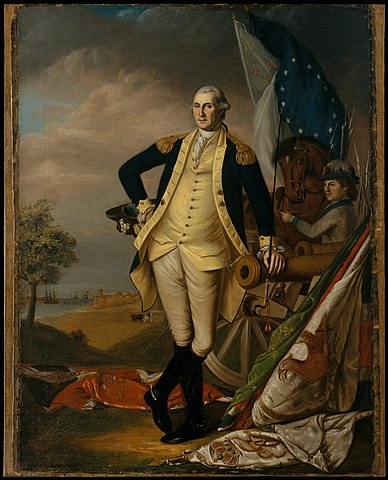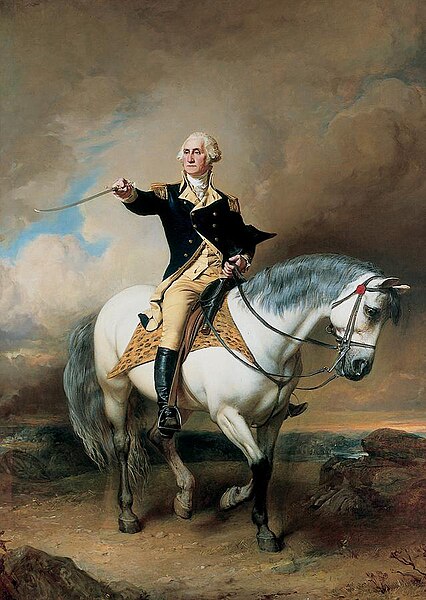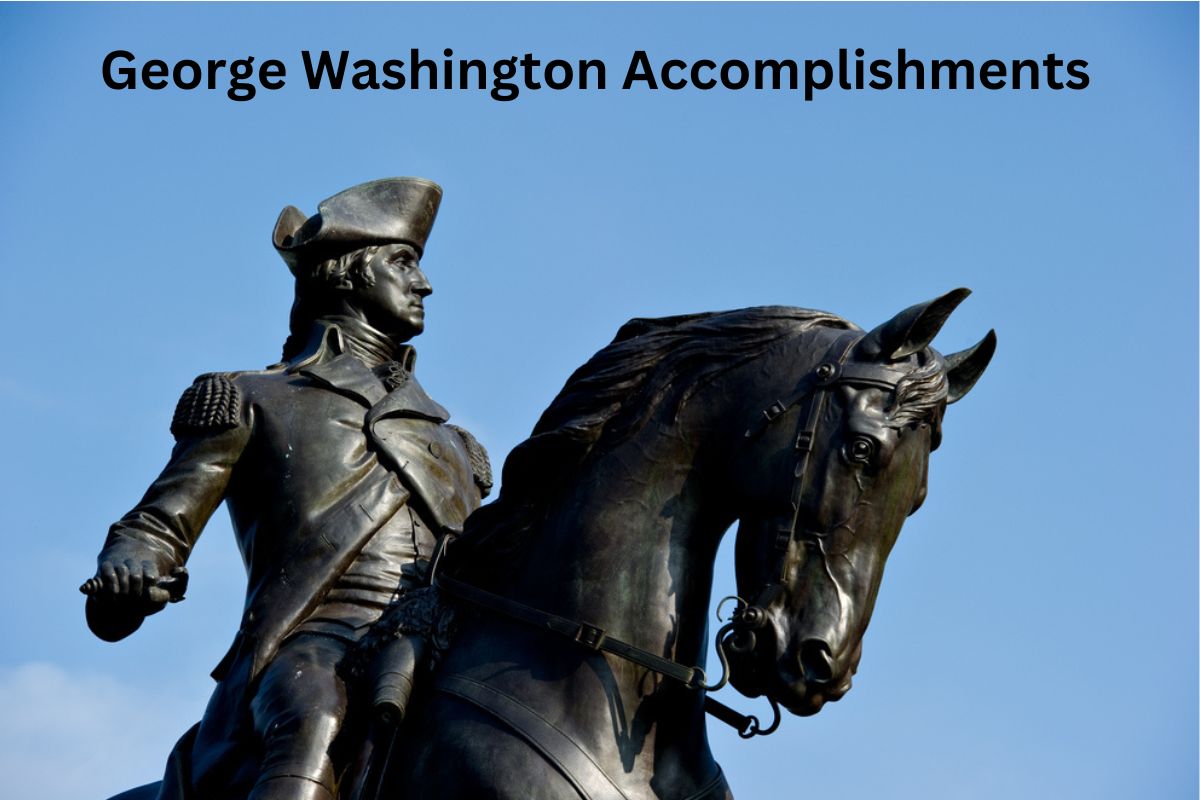George Washington (1732-1799) was an American military leader, statesman, and the first President of the United States. He led the Continental Army during the Revolutionary War, helped shape the United States Constitution, and established important precedents for the presidency.
Washington’s leadership and commitment to the principles of democracy and independence made him a revered figure in American history.
Renowned for his integrity, Washington voluntarily stepped down from the presidency after two terms, setting a precedent for peaceful transfers of power and reaffirming the principles of republican government.
In his Farewell Address, he offered valuable advice on maintaining national unity, avoiding partisan divisions, and avoiding entanglement in foreign conflicts.
George Washington’s contributions to the formation of the United States as a sovereign nation, his leadership during the Revolutionary War, and his commitment to democratic principles have solidified his place as one of America’s most revered Founding Fathers and the “Father of His Country.”
His legacy continues to inspire generations and serves as a guiding force for the nation’s leaders.
Accomplishments of George Washington
1. Commander-in-Chief of the Continental Army
During the American Revolutionary War (1775-1783), George Washington played a vital role as the Commander-in-Chief of the Continental Army.
He led the American forces against the British army, providing strategic guidance and inspiring his troops with his leadership. Despite facing numerous challenges and setbacks, Washington’s perseverance and determination helped keep the Revolutionary cause alive.
His leadership and military expertise were crucial in achieving ultimate victory, leading to the establishment of the United States as an independent nation.

2. First President of the United States
In 1789, George Washington was unanimously elected as the first President of the United States. This historic appointment not only marked the beginning of his presidential term but also set the precedent for the peaceful transfer of power in a democratic republic.
Also Read: Timeline of George Washington
As President, Washington faced the formidable task of defining the role and responsibilities of the presidency.
He worked diligently to establish the framework of the new government, appointing key positions, such as the Secretary of State and the Secretary of the Treasury, and laying the groundwork for future administrations.
3. Helped ratify the United States Constitution
As a delegate to the Constitutional Convention held in Philadelphia in 1787, Washington played a pivotal role in shaping the United States Constitution. His presence lent significant credibility to the convention, and his leadership helped forge the compromises necessary for its successful ratification.
Washington’s support of the Constitution was influential in garnering support from other states, ultimately leading to its adoption. His belief in a strong and balanced central government, with a system of checks and balances, helped solidify the foundation of the American constitutional system that endures to this day.
4. Issued the Farewell Address
In 1796, at the end of his second term as President, George Washington issued his Farewell Address. This address, which he had drafted with the help of Alexander Hamilton and James Madison, served as a parting message to the American people.
In it, Washington emphasized the importance of national unity, political harmony, and the preservation of the young nation’s independence. He warned against the dangers of political factionalism and urged future generations to prioritize the well-being of the nation over narrow partisan interests.
The Farewell Address became a revered document, offering guidance for future presidents and serving as a cornerstone of American political thought.

5. Established the Cabinet
As the first President of the United States, George Washington established the precedent of forming a Cabinet.
He selected capable individuals to serve as advisors in specific areas of governance, such as Thomas Jefferson as Secretary of State, Alexander Hamilton as Secretary of the Treasury, and Henry Knox as Secretary of War.
Washington recognized the importance of surrounding himself with experienced and knowledgeable individuals who could provide expertise and guidance on key matters of state.
The establishment of the Cabinet set a significant precedent for executive decision-making and ensured a breadth of perspectives in the administration.
6. Issued the Neutrality Proclamation
In 1793, as tensions escalated between France and Great Britain during the French Revolution, George Washington issued the Neutrality Proclamation. This proclamation declared that the United States would remain neutral in the conflict and would not take sides.
Washington’s decision to adopt a policy of neutrality was a crucial step in safeguarding the young nation’s interests. By avoiding entanglement in European conflicts, Washington sought to protect American trade, maintain peace, and preserve the United States’ fragile independence.
The Neutrality Proclamation set an important precedent for future administrations in shaping American foreign policy.
7. Suppressed the Whiskey Rebellion
In 1794, George Washington faced a significant domestic challenge known as the Whiskey Rebellion. This rebellion erupted in western Pennsylvania as a response to the federal government’s imposition of a tax on distilled spirits, which affected whiskey producers.
Washington viewed the rebellion as a threat to the authority of the newly formed federal government and its ability to enforce its laws. Taking decisive action, he called upon state militias to suppress the rebellion.
The show of force and Washington’s resolve sent a clear message that the federal government would not tolerate armed resistance to its laws. The successful suppression of the Whiskey Rebellion demonstrated the strength and authority of the federal government, establishing a precedent for future administrations.

8. Negotiated the Jay Treaty
In 1794, George Washington’s administration negotiated the Jay Treaty with Great Britain. The treaty, named after Chief Justice John Jay, aimed to resolve several issues left unresolved after the American Revolutionary War.
It addressed matters such as trade disputes, the British occupation of western forts, and the seizure of American merchant ships. While the treaty was not universally popular, it successfully averted a potential war between the United States and Great Britain.
The Jay Treaty improved commercial relations between the two nations and provided a framework for resolving future disputes through diplomacy rather than armed conflict.
9. Played a role in selecting the capital city (Washington, D.C.)
As President, George Washington played a significant role in the selection of the capital city for the United States. He personally oversaw the process of choosing the location for the federal district along the Potomac River, an area that eventually became the capital city, Washington, D.C.
Washington’s involvement in the selection of the capital was driven by his desire to establish a neutral and centralized seat of government. His vision of a distinct federal district, separate from any individual state, aimed to ensure the independence and efficiency of the federal government.
10. Establishment of the First Bank of the United States
In 1791, George Washington signed into law the creation of the First Bank of the United States. This bank, with a 20-year charter, was designed to centralize and regulate the nation’s finances.
The establishment of the bank helped stabilize the economy, provided a national currency, and facilitated economic growth by promoting commerce and trade. It set the stage for future developments in American banking and financial institutions.
